One could almost hear a collective gasp across the Middle East when Lebanese Prime Minister Saad Hariri made a most astonishing statement earlier this month. After vehemently accusing Syria of orchestrating his father’s murder in 2005, after leading a revolt that pushed Syrian troops out of Lebanon on the strength of that accusation, after galvanizing what seemed an unstoppable political movement on the power of those charges, Hariri said it had all been just one big mistake. The reversal marked the passing of a short-lived era in Lebanese history and of Western influence in Lebanon, a country that serves as […]
Middle East & North Africa Archive
Free Newsletter
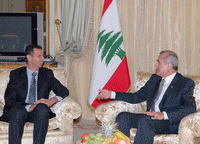
An increasingly vicious battle that has broken out between pro- and anti-Syrian factions in Lebanon is likely to determine the country’s ability to resist Syrian interference in its internal politics. Also at stake in the conflict is the future of a United Nations investigation into the 2005 assassination of former Lebanese Prime Minister Rafik Hariri. The assassination sparked a protest movement that blamed Syria for Hariri’s killing and forced Damascus to withdraw its troops after a nearly 30-year presence in Lebanon. The anti-Syrian groundswell paved the way for Saad Hariri, Rafik Hariri’s son, to become prime minister. Syria and its […]
Despite some typically incendiary remarks, Iranian President Mahmoud Ahmadinejad’s attendance at the U.N. General Assembly’s 65th session in New York was marked by a low-key tone noted by many. The change in tone, including a reported willingness to resume talks with the U.S. and its allies, reflects the impact of Iran’s domestic politics. For increasingly, Ahmadinejad’s real battle is at home, against the mullahs who brought him to power. And in that struggle, Ahmadinejad and his allies are increasingly embracing Iran’s venerable 2,500-year-old national heritage to attack its recent three-decade Islamist experiment. The latest salvo, via a Web site called […]
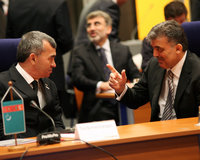
On Sep. 6, the European Investment Bank, the European Bank for Reconstruction and Development, and the International Financial Corporation (a branch of the World Bank Group) signed a mandate letter with the consortium behind the Nabucco natural gas pipeline, marking the start of an appraisal process that will eventually secure a €4 billion financing package for the project. The three international financial institutions committed €2 billion, €1.2 billion and €800 million, respectively. Along with the more modest €200 million grant provided by the European Commission last March, the contributions will certainly boost confidence in the project among private investors, who […]
When Bob Woodward’s book, “Obama’s Wars,” is released on Monday, the denizens of Washington’s Beltway will eagerly skip to the index to see whether they are mentioned — and if not, who is. But as they digest the stories of infighting, rivalry and catty comments among the president’s national security team, excerpts of which have already begun to circulate, the larger question is whether the revelations in the latest Woodward tome will have an impact on the Obama administration’s Afghan policy. Woodward seems to confirm what many have suspected ever since President Barack Obama’s speech at West Point announcing the […]
The theory behind Turkey’s foreign policy, as summed up by Turkish academic-turned-Foreign Minister Ahmet Davutoglu, is the “zero problems with neighbors” policy. As such, Turkey has put increasing effort into resolving longstanding tensions in its regional relations. The results have admittedly been spotty. Bilateral ties with Syria, Iran and Kurdish Iraq are notable successes. The rapprochement with Armenia is still a work in progress. The historic friendship with Israel has suffered dramatically from Turkey’s decision to take a more vocal position on the question of Gaza. But in theory, it’s a great approach to 21st century foreign policy, which is […]

Years ago, when world leaders started speaking out about the dangers of Iran’s nuclear program, one of the potential threats they cited was the possibility that it would spark a flurry of competing nuclear programs throughout the Middle East. Today, as international efforts to stop Iran’s uranium enrichment remain unsuccessful, the once-distant prospect of a Middle East crowded with nuclear plants has moved a long way toward becoming a reality. In recent days, Jordan signed a nuclear cooperation deal with Japan, setting the stage for the Hashemite kingdom to start receiving nuclear technology and nuclear materials. Japanese officials also inked […]
This proposed India-Oman deepwater natural gas pipeline represents a potential major shift in the connectivity networks linking Central Asia to South Asia. Once laid, pipelines help determine geopolitical realities for decades, as a glance at the legacy impact of Soviet-Russian pipelines on Central Asian politics reveals. If the Gulf serves as an effective workaround to bypass the Afghanistan-Pakistan transit route, it would dramatically reduce the strategic logic of stabilizing the Af-Pak region. The fact that Iran is involved in this deal as a source country is also a major plus, as it applies additional commercial constraints on Tehran to keep […]
With international attention overwhelmingly focused on Iran’s nuclear program and its ultimate objectives, the country’s conventional weapons capability often goes unexamined. In an e-mail interview, Anoush Ehteshami, professor of international relations at Durham University’s School of Government and International Affairs, discusses Iran’s conventional weapons capability. WPR: What conventional weapons capability does Iran currently have, and how much does it devote to defense spending? Anoush Ehteshami: Iran’s conventional weapons capability has gone through a revolution since 1979 and the subsequent severance of ties with the U.S. and other Western militaries. The eight-year-long Iran-Iraq war had the most direct impact, in terms […]
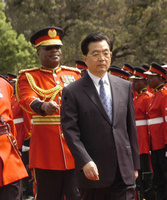
When Europe ran the world, trade followed the flag, meaning that globalization in its initial expression — otherwise known as colonialism — grew out of the barrel of a gun, to paraphrase Mao Zedong. On this subject, Franklin Roosevelt and Vladimir Lenin agreed, even if that conclusion led them to embrace diametrically opposed strategies: FDR’s realization that “the colonial system means war” drove him to erect an international liberal trade order following World War II that doomed the vast colonial systems of his closest European allies. Roosevelt’s success not only enabled America to contain and ultimately defeat the soul-crushing Soviet […]
I had the pleasure of participating in a France 24 panel discussion program on Monday, but which was just posted online yesterday. The subject was Turkey’s role in the Middle East and its EU accession prospects in the aftermath of last Sunday’s referendum. Part one can be found here. Part two can be found here. This was another one where I managed to express everything I had in mind. I might have added my “Turkey as Rorschach test” theory, whereby what analysts say about Turkey reveals more about them than about Turkey. But I think it comes across in the […]
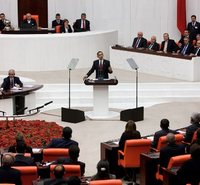
If America could be magically granted its ideal Muslim strategic partner, what would we ask for? Would we want a country that fell in line with every U.S. foreign policy stance? Not if the regime was to have any credibility with the Islamic world. No, ideally, the government would be just Islamist enough to be seen as preserving the nation’s religious and cultural identity, even as it aggressively modernized its society and connected its economy to the larger world. It would have an activist foreign policy that emphasized diplomacy, multilateralism and regional stability, while also maintaining sufficient independence from America […]
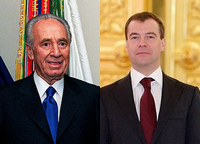
Agence France Presse reported last week that Russia signed a five-year military cooperation agreement with Israel. Russian Defense Minister Anatoly Serdyukov announced the agreement, which includes joint defense education and medical training, on Sept. 6, after meeting with his Israeli counterpart, Ehud Barak, in Moscow. Fifty Russian crewmembers are already in Israel training to operate the 36 drones Moscow that ordered after its 2008 war with Georgia, and the Russians are now proposing a joint production line to manufacture Israeli-designed UAVs in Russia. The defense agreement comes just weeks after former Israeli Defense Minister Moshe Arens wrote an op-ed in […]
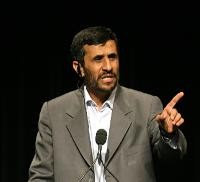
In early August, at the fourth trilateral summit between Iran, Afghanistan and Tajikistan held in Tehran, Iranian President Mahmoud Ahmadinejad urged the leaders of the other two countries to join in an alliance to counterbalance NATO’s growing presence in Central Asia. Though any such formal alliance is unlikely, the declaration reflects Tehran’s desire to play a larger role in Central Asia’s regional dynamics. If Iran has always been geographically part of the regional context of Central Asia and the Caucasus, Tehran’s geopolitical orientation has historically been focused southward, on the Persian Gulf. For more than a century, Iranian interests in […]
I mentioned in my first post back from vacation that the U.S. should be focusing its foreign policy attention on Africa in the “post-Iraq” era. The reasons why remained inchoate and intuitive, untilNikolas Gvosdev, in his WPR column today, helped me bring them into focus when he wrote: Beyond Latin America, the [U.S. should] explore ways to bind Western and Southern Africa closer to the United States. . . . Washington should pay more attention to surrounding the United States with a “ring of friends” to its south, rather than thinking of our security as guaranteed by the oceans to […]
Leaders from Egypt, Iran, Bangladesh, Nigeria, Indonesia, Malaysia, Pakistan, and Turkey attended a Developing 8 summit in Abuja, Nigeria in July. In an e-mail interview, Gareth Jenkins, Istanbul-based analyst and author of “Political Islam in Turkey: Running West, Heading East?“, explains the background and current state of the D-8. WPR: What is the historic background and focus of the Developing 8, and how is it evolving? Gareth Jenkins: The Developing 8 (D-8) was founded on June 15, 1997, in Istanbul. It was the brainchild of Necmettin Erbakan, modern Turkey’s first Islamist prime minister, who wanted to create a Muslim alternative […]
I just got a chance to go through the just-leaked IAEA report on Iran’s nuclear program now, but one thing I’d already noticed is that despite the write-ups of the findings being characteristically damning, no one really paid any attention. Either everyone has been too busy to take a close look, which is possible, since I certainly was. Or else there’s a “violation fatigue” that has set in, whereby the consensus understanding is shifting toward accepting that Iran simply won’t stop its enrichment efforts, whether in LEU or 20 percent enriched uranium. If that’s true, it will probably take something […]
